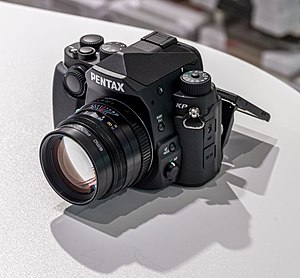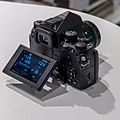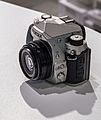Pentax KP
 | |
| Overview | |
|---|---|
| Maker | Ricoh |
| Type | Digital single-lens reflex camera |
| Released | January 2017 |
| Lens | |
| Lens mount | Pentax KAF3 and KAF2 mount compatible with Pentax auto-aperture lenses; older lenses supported in stop-down metering mode |
| Lens | Interchangeable |
| Sensor/medium | |
| Sensor | APS-C 23.5 × 15.6 mm CMOS sensor |
| Maximum resolution | 24.32 megapixels (6016×4000) |
| Film speed | ISO 100–819,200 in 1, 1⁄2, or 1⁄3 EV steps |
| Recording medium | 1 slot for SD/SDHC/SDXC; dedicated Flucard for wireless tethering available |
| Exposure/metering | |
| Exposure modes | Green (fully automatic), program, aperture priority, shutter priority, sensitivity priority, aperture and shutter priority, manual, bulb, five User presets. |
| Exposure metering | 86,000-pixel RGB metering sensor with Real-Time Scene Analysis System |
| Metering modes | Multi-segment, Center-weighted, Spot |
| Flash | |
| Flash | Onboard pop-up flash; hot shoe for P-TTL flash units with high-speed sync support; PC socket for studio flashes; 1/180 s X-sync speed |
| Shutter | |
| Shutter speed range | Mechanical shutter: 1/6000 to 30 sec, Bulb; Electronic shutter: 1/24000 to 30 sec |
| Continuous shooting | Up to 7 fps |
| Viewfinder | |
| Viewfinder | Eye-level pentaprism, 100% coverage, 0.95× magnification |
| Viewfinder magnification | 0.63x |
| General | |
| LCD screen | 3.0 in (76 mm), 921,000 dots |
| Battery | D-LI109 lithium-ion rechargeable battery |
| Dimensions | 131.5×101×76 mm |
| Weight | With battery: 703 g (24.8 oz) Without battery: 643 g (22.7 oz) |
| Made in | |
The Pentax KP is a 24 megapixel compact APS-C AA-filterless digital SLR camera announced by Ricoh on January 25, 2017. It features a PRIME IV image processor with an "image accelerator unit" that supports its operation up to ISO 819,200. It has a 1/6000s conventional and 1/24,000s electronic shutter (available in Live View). In terms of bracketing modes, it adds depth of field and shutter speed bracketing. The Pentax KP uses the Pentax K-mount interchangeable lens system.
Compared to Pentax K-70
The Pentax KP is similar in many aspects to the about half year older K-70 but significantly more expensive. The differences are:[1][2]
- The KP has a more vintage, old film SLR looking body and they also have a different button layout.
- The material of the bodies is also different, the KP has a magnesium alloy construction built on a stainless steel chassis whereas the K-70 is made out of plastic.
- The KP can shoot a 7 fps continuous burst, the K-70 is one fps slower.
- The maximum ISO sensitivity is eight times higher on the KP (819,200 vs 102,400).
- The image sensor in the KP has a 0.1 MP resolution advantage
- The KP autofocus features 16 more focus points (27, 25 of them are cross type vs 11, 9 of them are cross type).
- The KP has the option to use electronic shutter instead of a mechanical shutter.
- The K-70 can take 20 more pictures with one battery charge (410 vs 390 shots) and two times longer flash coverage (12 meters vs 6 meters).
- The rear display can only tilt in the KP, the one in the K-70 is fully articulated while using the same LCD panel.
References
- ^ "Pentax KP Officially Announced - Pentax Announcements". PentaxForums.com. Retrieved 2017-01-26.
- ^ "Ricoh announces Pentax KP with new Shake Reduction system and 24MP sensor: Digital Photography Review". Dpreview.com. Retrieved 2017-01-26.
External links










